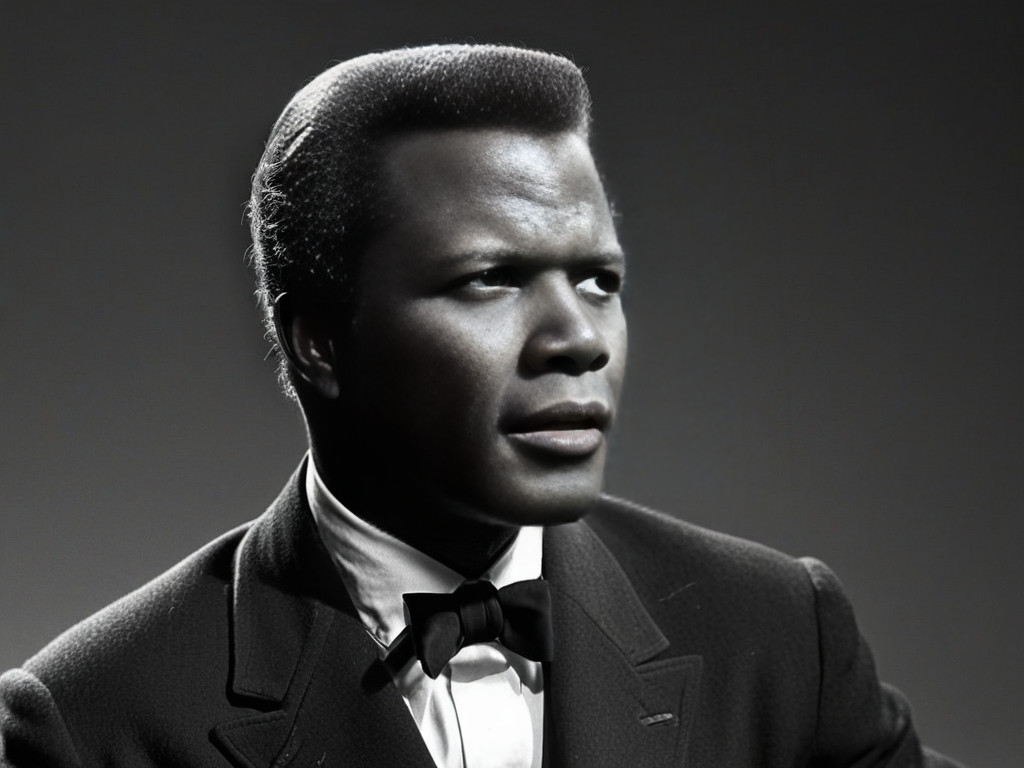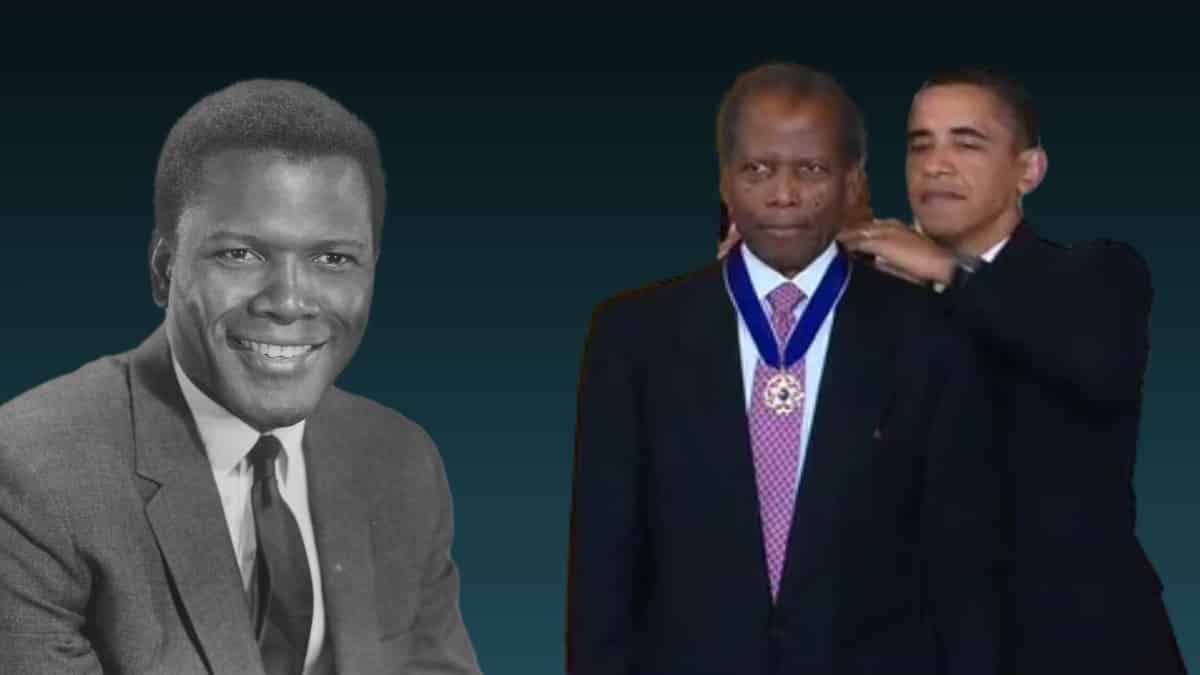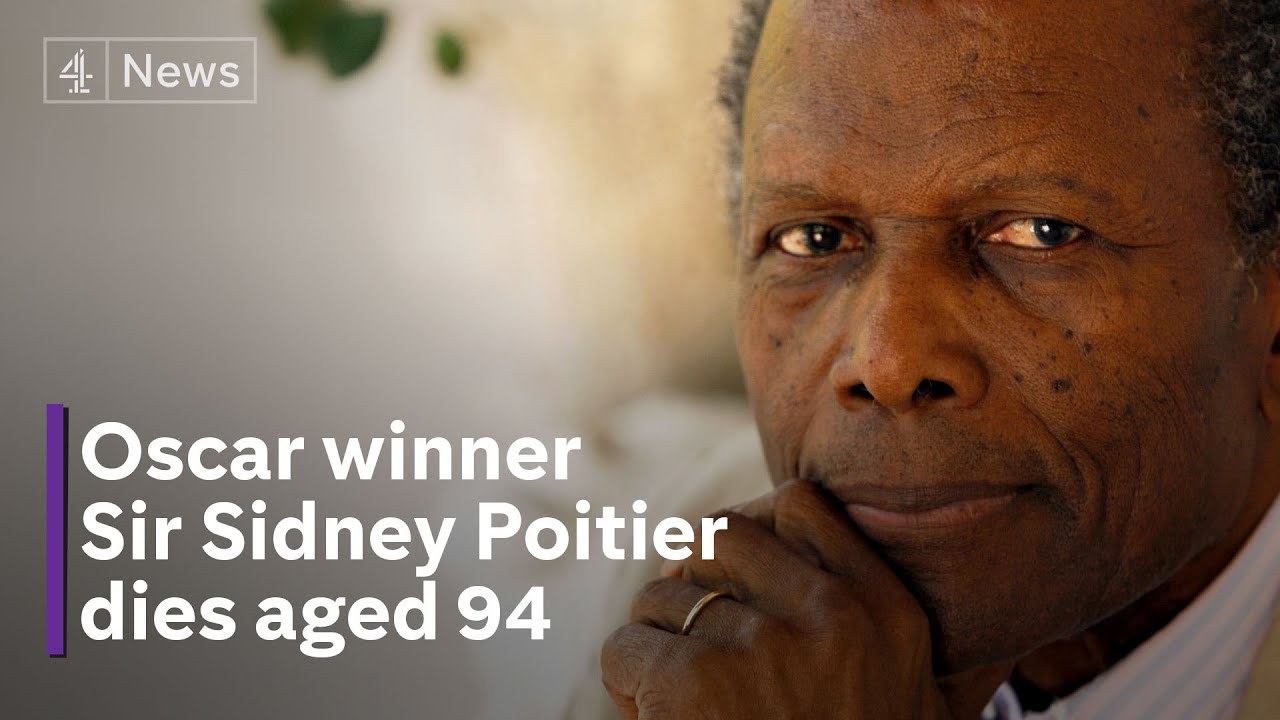Sidney Poitier died on Friday at age 94. The Bahamas Prime Minister Philip Davis broke the sad news in a speech broadcast on Facebook
Sidney Poitier was Born Sidney L. Poitier on February 20, 1927. He was a Bahamian-American actor, film director, activist, and ambassador. 1964, Poitier won the Academy Award for Best Actor, becoming the first African American and Bahamian actor to win the award. He received two Academy Award nominations, ten Golden Globes nominations, two Primetime Emmy Awards nominations, six BAFTA nominations, eight Laurel nominations, and one Screen Actors Guild Awards nomination.
From 1997 to 2007, he was the Bahamian Ambassador to Japan.
Poitier’s entire family lived in the Bahamas, which is still a British colony. Still, he was born unexpectedly in Miami while they were visiting for the weekend, which automatically granted him U.S. citizenship. He grew up in the Bahamas but moved to Miami at age 15 and New York City when he was 16.
He joined the American Negro Theater, landing his breakthrough film role as a high school student in Blackboard Jungle (1955). In 1958, Poitier starred with Tony Curtis as chained-together escaped convicts in The Defiant Ones, which received nine Academy Award nominations. Both actors received a nomination for Best Actor, with Poitier’s being the first for a Black actor and a nomination for a BAFTA, which Poitier won. In 1964, he won the Academy Award and the Golden Globe Award for Best Actor for Lilies of the Field (1963), playing a handyman helping a group of German-speaking nuns build a chapel.
Poitier also received acclaim for Porgy and Bess (1959), A Raisin in the Sun (1961), and A Patch of Blue (1965). He continued to break ground in three successful 1967 films that dealt with race and race relations: To Sir, with Love; Guess Who’s Coming to Dinner; and In the Heat of the Night. He received Golden Globe and British Academy Film Award nominations for his performance in the last film.
He was the top box-office star of the year in 1968. In the 1970s, Poitier also directed various comedy films, including Stir Crazy (1980), starring Richard Pryor and Gene Wilder, among other films. After nearly a decade of acting, he returned to television and film, starring in Shoot to Kill (1988) and Sneakers (1992).
Queen Elizabeth II granted Poitier a knighthood in 1974, and in 1995, Poitier received the Kennedy Center Honor. Also in 2009, Poitier was awarded the Presidential Medal of Freedom, the United States’ highest civilian honour. In 2016, he was awarded the BAFTA Fellowship for outstanding lifetime achievement in film. In 1999, Poitier was ranked 22nd among the male actors on the “100 Years…100 Stars” list by the American Film Institute. Poitier also received a Grammy Award for Best Spoken Word Album.
In 1982, he received the Golden Globe Cecil B. DeMille Award; in 2000, he received the Screen Actors Guild Life Achievement Award. In 2002, Poitier was chosen to receive an Academy Honorary Award to recognize his “remarkable accomplishments as an artist and human being.”
In his Facebook broadcast, the Bahamas Prime Minister said, “It is with great sadness that I learned this morning of the passing of Sir Sidney Poitier.” He added, “But even as we mourn, we celebrate the life of a great Bahamian: a cultural icon, an actor and film director, an entrepreneur, civil and human rights activist, and, latterly, a diplomat.”
His parents were Bahamian farmers who had travelled to the U.S. to sell tomatoes. He was born prematurely on U.S. soil, so he became a U.S. and Bahamas citizen. But he was raised in the Bahamas, moving to Miami and then New York when he was 15.
He spent time in the U.S. Army before joining the American Negro Theatre in Harlem. His career as a stage actor was limited because he was tone-deaf so that he couldn’t sing and dance — something expected of Black stage performers at that time.
Poitier’s second marriage, in 1976, was to Canadian actress Joanna Shimkus. He had six daughters from his two marriages.
He spent his last years in the Bahamas.
Other actors that died recently | Sidney Poitier before death
Remembering
It is with heavy hearts and deep sorrow that we mourn the passing of the legendary actor Sidney Poitier, who left an indelible mark on the world of cinema and beyond. Poitier, a trailblazer in the film industry, passed away at 94, leaving behind a legacy of groundbreaking achievements, social change, and cultural significance that will forever be remembered.

Born on February 20, 1927, in Miami, Florida, Poitier defied the odds and shattered colour barriers in Hollywood to become the first Black actor to win an Academy Award for Best Actor for his role in “Lilies of the Field” in 1963. Throughout his illustrious career, he starred in numerous iconic films, including “Guess Who’s Coming to Dinner,” “To Sir, with Love,” and “In the Heat of the Night,” which challenged racial stereotypes and brought issues of race and equality to the forefront of American consciousness.
Poitier’s commanding presence and undeniable talent captivated audiences worldwide, earning him critical acclaim and cementing his status as a cultural icon. His performances were powerful and compelling and served as a catalyst for social change, inspiring generations of Black actors and filmmakers to strive for excellence and authenticity in their craft.
Beyond his remarkable acting career, Poitier was a devoted humanitarian. He used his platform to advocate for civil rights, racial equality, and social justice. His activism and advocacy work had a lasting impact on society, paving the way for greater representation and diversity in the entertainment industry and beyond.
In addition to his professional accomplishments, Poitier was a loving father, devoted husband, and cherished friend. His humility, grace, and integrity were evident in every aspect of his life, and his genuine kindness and generosity touched the hearts of all who had the privilege of knowing him.
Sidney Poitier’s legacy will continue to inspire and uplift future generations, reminding us of the power of resilience, courage, and compassion in the face of adversity. His contribution to the arts and his commitment to social change will be remembered and celebrated forever.
As we bid farewell to this remarkable man, honour his memory by carrying on his love, understanding, and unity legacy. Sidney Poitier may have left this world, but his spirit will live on in the hearts of those touched by his brilliance and unwavering commitment to making the world a better place.
Rest in peace, dear Sidney Poitier. You will be dearly missed, but your impact on the world will never be forgotten. Your light will continue to shine brightly, guiding us toward a future of hope, equality, and justice for all.









Sir Sidney Poitier, KBE: Article for QUOTABLE CARIBBEAN (SPECIAL EDITION) – JANUARY 10, 2022.
“We admire the man, not just because of his colossal achievements, but also because of who he was: his strength of character; his willingness to stand up and be counted; and the way he plotted and navigated his life’s journey. The boy who moved from the tomato farm of Cat Island to become a waiter in the United States.
The young man who not only taught himself to read and write but who made the expression of words and thoughts and feelings central to his career. The man who expressed his rage against racial injustice through quiet dignity, the humanitarian who used his steely determination not just to better himself but to better the world that he lived in, filtered through the milk of human kindness. And all of it achieved without sacrificing integrity, charm, elegance or wit.” — Philip E. Davis, Prime Minister, The Bahamas.
“Sidney Poitier, through his actions and the roles he played, was part of my education and contributed to my understanding of racial discrimination and prejudice and the struggle to overcome. He was a distinguished actor, positive role model, and symbol of dignity in the struggle for equality and justice. May his soul Rest In Peace.” — Andrew Holness, Prime Minister, Jamaica
“Despite the many odds stacked against him, Poitier defied racial barriers and personal circumstances to become an acclaimed, history-making black actor. He leaves behind a body of work on and off camera, which has inspired many generations. May his life remind us that our struggles are not insurmountable if only we are willing to do the work. Rest in Peace Sir Sidney Poitier.” — Philip J. Pierre, Prime Minister, St. Lucia
“The son of tomato farmers in the Bahamas, Sidney became the first Black man to win the Academy Award for Best Actor — but the trail he blazed extended leaps and bounds beyond his background or profession. He blazed a path for our Nation to follow, and a legacy that touches every part of our society today.” — Joseph Biden, President, United States of America.
“For over 80 years, Sidney and I laughed, cried, and made as much mischief as we could. He was truly my brother and partner in trying to make this world a little better. He certainly made mine a whole lot better.” — Harry Belafonte, Caribbean-American singer, songwriter, activist, and actor (Black Enterprise)
“It was a privilege to call Sidney Poitier my friend. He was a gentleman and opened doors for all of us that had been closed for years. God bless him and his family.” — Denzel Washington, American actor, director, and producer (BBC)
“I was happy for me, but I was also happy for the ‘folks.’ We Black people had done it. We were capable. We sometimes forget, having to persevere against unspeakable odds that we are capable of infinitely more than the culture is yet willing to credit to our account.” — Bahamian-American Sir Sidney Poitier (on becoming the first Black actor to win an Oscar in 1964, from his memoir.) (Associated Press)